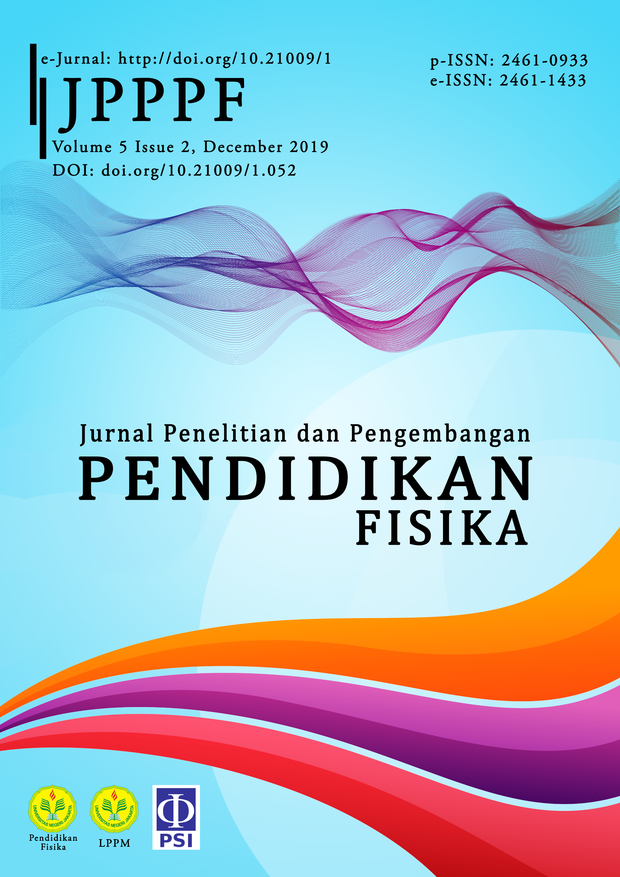The Effectiveness of Teachers’ Use of Lecture Model Combined with Cooperative Learning Method for Enhancing Students’ Problem-Solving Skills in Physics
DOI:
https://doi.org/10.21009/1.05203Keywords:
lecture model, combined with, cooperative learning method, problem-solving skills, physics educationAbstract
This study investigates the effect of the use of teachers’ Lecture models combined with cooperative learning methods to improve students’ problem-solving skills in physics compare with the control group who were not exposed to the lecture model combined with cooperative learning methods from effect size value. The research method was a quasi-experimental research. The sample consisted of 33 students of 10th grade in middle schools (senior high school), SMAN 1 Sungai Penuh, Jambi Province where they ware learn at work and energy concept. Students' achievements, as well as their problem-solving skills of work and energy concept were assessed by pretest-posttest with an essay test. The results showed that the experimental group’s learning process has a high effect size value to problem-solving skills more than control group learning process. That shows the lecture model combined with cooperative learning method more effective than lecture model.
References
Argaw, AS, Haile, BB, Ayalew, BT, & Kuma, SG 2016, ‘The Effect of Problem Based Learning (PBL) Instruction on Students’ Motivation and Problem Solving Skills of Physics’, Eurasia Journal of Mathematics Science and Technology Education, vol. 13, no. 3, pp. 857-871. DOI 10.12973/eurasia.2017.00647a
Azizan, MT, Mellon, N, Ramli, RM, & Yusup, S 2018, ‘Improving teamwork skills and enhancing deep learning via development of board game using cooperative learning method in reacting engineering course’, Educational for chemical engineers, vol. 22, no. 1, pp. 1-13. DOI: 10.1016/j.ece.2017.10.002
Cohen, J 1988, Statistical Power Analysis for the Behavioral Sciences (2th Edition), Lawrence Erlbaum Associates, United States of America.
Emerson, TLN, English, L, & McGoldrick, K 2016, ‘Cooperative Learning and Personality Types’, International Review of Economics Education, vol. 21, pp. 21-29. DOI: http://dx.doi.org/10.1016/j.iree.2015.12.003
Eshetu, F, Assefa, S 2019, ‘Effects of Context-Based Instructional Approaches on Students’ Problem-Solving Skills in Rotation Motion’, EURASIA Journal of Mathematics, Science and Technology Education, vol. 15, no. 2, pp. 1-13. https://doi.org/10.29333/ejmste/102283
Felder, RM, & Brent, R 2007, Cooperative Learning’, P.A. Mabrouk, ed., Active Learning: Models from the Analytical Sciences, ACS Symposium Series 970, Chapter 4, American Chemical Society, Washington DC.
Foldnes, N 2016, ‘The Flipped Classroom and Cooperative Learning: Evidence from a Randomised Experiment’, Active Learning In Higher Education, vol. 17, no. 1, pp. 39-49. DOI: 10.1177/1469787415616726
Gull, F, & Shehzed, S 2015, ‘Effects of Cooperative Learning on Students’ Academic Achievement’, Journal of Education and Learning, vol. 9, no. 3, pp. 246-255.
Hyun, J, Ediger, R, & Lee, D 2017, ‘Students’ Satisfaction on Their Learning Process in Active Learning and Traditional Classrooms’, International Journal of Teaching and Learning in Higher Education, vol. 29, no. 1, pp. 108-118. ISSN: 1812-9129.
Johnson, JP, Mighten, A 2005, ‘A Comparison of Teaching Strategies: Lecture Notes Combined with Structured Group Discussion Versus Lecture Only’, Journal of Nursing Education, vol. 44, no. 7, pp. 319-322.
Kaur, G 2011, ‘Study and Analysis of Lecture Model of Teaching’, International Journal of Education Planning & Administration, vol. 1, no. 1, pp. 9-13.
Khairati, IA, Feranie, S, & Karim, S 2016, ‘Penerapan Strategi Metakognisi pada Cooperative Learning untuk Mengetahui Profil Metakognisi dan Peningkatan Prestasi Belajar Siswa SMA pada Materi Fluida Statis’, JPPPF (Jurnal Penelitian & Pengembangan Pendidikan Fisika), vol. 2, no. 1, pp. 65-72. DOI: doi.org/10.21009/1.02110
Knapp, LR, Glenn, AL 1996, Restructing School with Technology, Allyn & Bacon, Massachusetts.
Luangrath, P, Pettersson, S 2012, ‘Problems and Possibilities with Centering Physics Teaching around Student Discussions’, Eurasia Journal of Mathematics, Science & Technology Education, vol. 8, no. 3, pp. 189-200. DOI: 10.12973/eurasia.2012.834a
Malik, A, Oktaviani, V, Handayani, W, & Chusni, MM 2017, ‘Penerapan model process oriented guided inquiry learning (POGIL) untuk meningkatkan keterampilan berpikir kritis peserta didik’, JPPPF (Jurnal Penelitian & Pengembangan Pendidikan Fisika), vol. 3, no. 2, pp. 127-136. DOI: doi.org/10.21009/1.03202
Miller, CJ, McNear, & Metz, MJ 2013, ‘A Comparison of Traditional and Engaging Lecture Methods in a Large, Professional-level Course’, Adv Physiol Educ, vol. 37, pp. 347-355. doi:10.1152/advan.00050.2013
Mohammadjani, F, Tonkaboni, F 2015, ‘A Comparison between the Effect of Cooperative Learning Teaching Method and Lecture Teaching Method on Students’ Learning and Satisfaction Level’, International Education Studies, vol. 8, no. 9, pp. 107-112. ISSN 1913-9020 E-ISSN 1913-9039
Pugsley, KE, Clayton, LH 2003, ‘Traditional Lecture or Experiential Learning: Changing Student Attitudes’, Journal of Nursing Education 42(11), pp 520-523.
Ronchetti, M 2010, ‘The VOLARE Methodology: Using Technology to Help Changing the Traditional Lecture Model’, Tech-Education, CCIS 73, pp. 134-140.
Suardi, Kanji, H 2018, ‘Lecture Model of Student Transfer Discussion Method to Increase Student’s Activeness and Learning Outcomes’, EST Journal of Educational Science and Technology, vol. 4, no. 1, pp. 48-54. DOI: http://dx.doi.org/10.26858/est.v4i1.4814
Temur, OD 2012, ‘Analysis of Prospective Classroom Teachers’ Teaching of Mathematical Modeling and Problem Solving’, Eurasia Journal of Mathematics, Science & Technology Education, vol. 8, no. 2, pp. 83-93. ISSN: 1305-8223
The Partnership for 21st Century Skills 2009, P21 Framework Definition’s.
Warfa, ARM 2016, ‘Using cooperative learning to teach chemistry: A meta-analytic review’. Journal of chemical education, pp. 1-8. DOI: 10.1021/acs.jchemed.5b00608
Widhiarso, W 2011, Aplikasi Anava Campuran untuk Desain Eksperimen Pre-Post Test Design, Fakultas Psikologi Universitas Gajah Mada, Yogyakarta.
Zakaria, E, Ikhsan, Z 2007, ‘Promoting Cooperative Learning in Science and Mathematics Education: A Malaysian Perspective’, Eurasia Journal of Mathematics, Science & Technology Education, vol. 3, no. 1, pp. 35-39. ISSN: 1305-8223.











